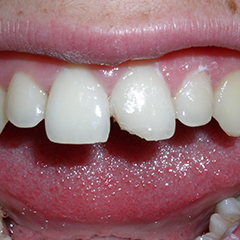
Also called minor cracks, these are cracks that affect the enamel, which is the outer white surface of the tooth. Often times, they are shallow and cause no pain. And dentist may need only to polish the area to smooth out the rough spots.
Also called minor cracks, these are cracks that affect the enamel, which is the outer white surface of the tooth. Often times, they are shallow and cause no pain. And dentist may need only to polish the area to smooth out the rough spots.
Minor chips will don’t usually require treatment either. They don’t cause pain, so chips are not a cause for concern other than they way that they look.
The fracture affects the whole tooth, from the enamel to the nerve. Early diagnosis and treatment is crucial for saving the tooth. Without treatment, the crack gradually spreads and worsens beyond repair.
This type of break almost always causes tooth sensitivity and aches because it’s deep enough to expose the nerve. Often times, The broken part of the tooth will bleed.
This type of break occurs when the tooth has split vertically into separate parts. This is often the result of a long-term cracked tooth.
This occurs when the cusped, pointed chewing surfaces of teeth are broken. A broken cusp doesn't always cause much pain because it doesn’t affect the pulp.
When a cavity weakens a tooth from the inside out, it can lead to a broken tooth.
These cracks begin at the root of the tooth and extend up towards the chewing surface. If they become infected, the area around the root will be inflamed and cause pain.
As soon as your have a broken or fractured tooth, you should see your dentist as soon as possible. In the meantime, WebMD recommends a few things you can do to relieve the pain and reduce swelling:
Rinse your mouth with warm salt water.
Take an over-the-counter pain reliever, like acetaminophen.
To prevent a sharp or jagged edge from cutting your tongue or mouth, cover the broken tooth with a piece of wax paraffin or sugar-free chewing gum.
If you need to eat, stick to soft foods and avoid using your broken tooth to chew.

Use emergency dental service to find emergency dentists near you that have the ability to care for all dental emergencies that may occur unexpectedly. Our patient support center is open to take emergency calls 24 hours a day 7 days each week and will connect you with multiple dentists that have walk-in appointment hours. To get started, call our 24/7 emergency dental service number: 1-888-350-1340, enter your zip code, and then wait to be connected with a dentist near you.
Emergency Weekend Dentist
Emergency Weekend Dentist
Emergency Weekend Dentist
Emergency Weekend Dentist
Emergency Weekend Dentist
Emergency Weekend Dentist
Emergency Weekend Dentist
Emergency Weekend Dentist
Emergency Weekend Dentist
Emergency Weekend Dentist